Module 9 Life history Unit 3 Language in use 课件(共28张PPT,内嵌音频)
文档属性
| 名称 | Module 9 Life history Unit 3 Language in use 课件(共28张PPT,内嵌音频) | 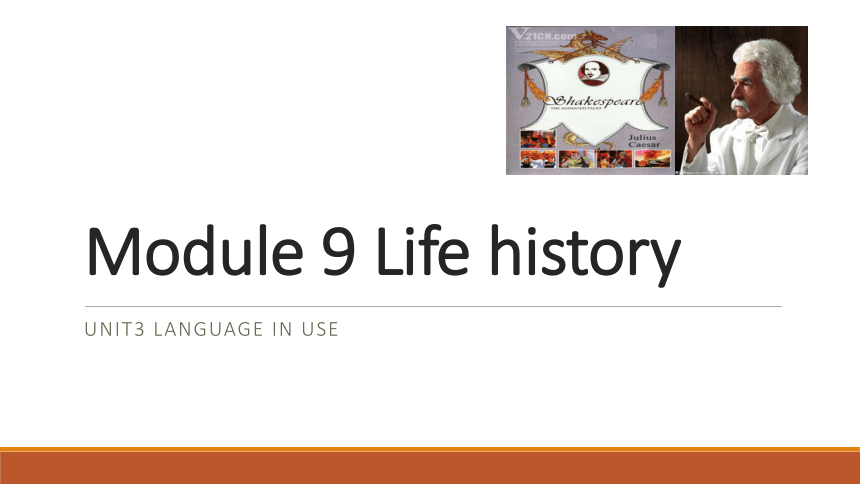 | |
| 格式 | zip | ||
| 文件大小 | 58.9MB | ||
| 资源类型 | 教案 | ||
| 版本资源 | 外研版 | ||
| 科目 | 英语 | ||
| 更新时间 | 2020-04-28 08:37:17 | ||
图片预览

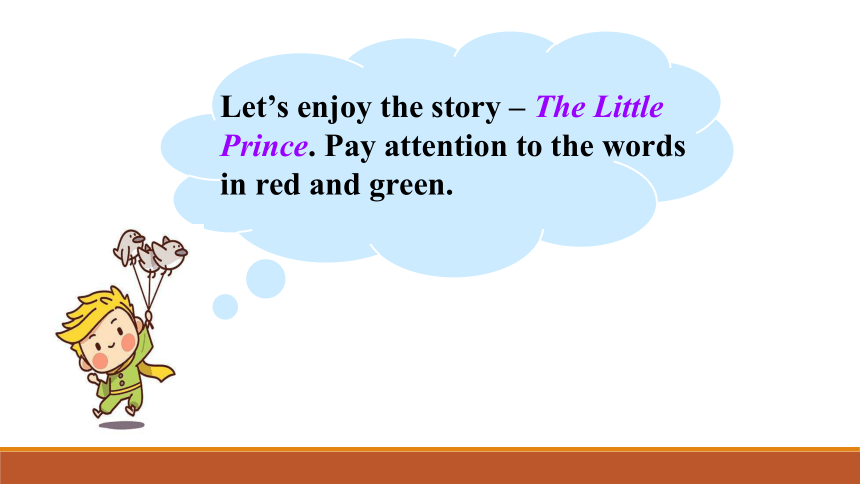
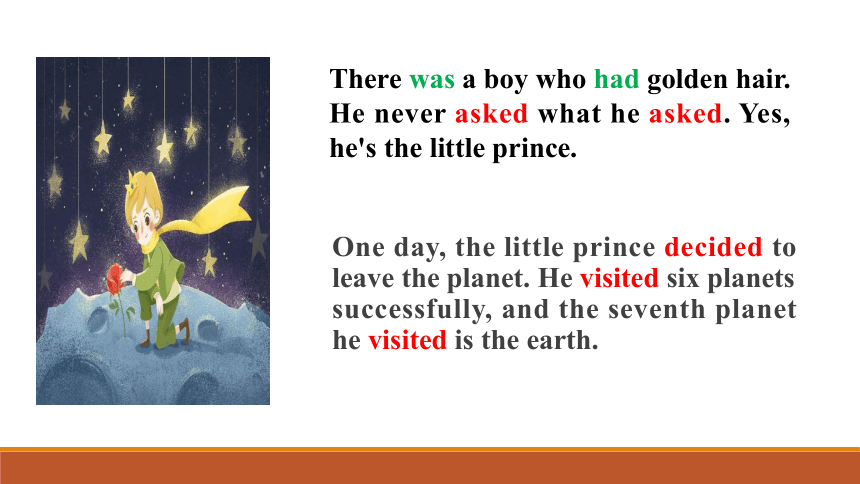

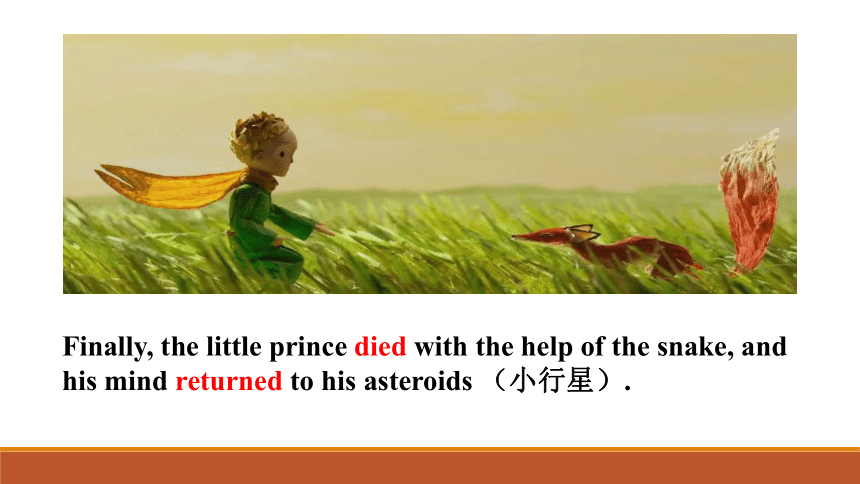
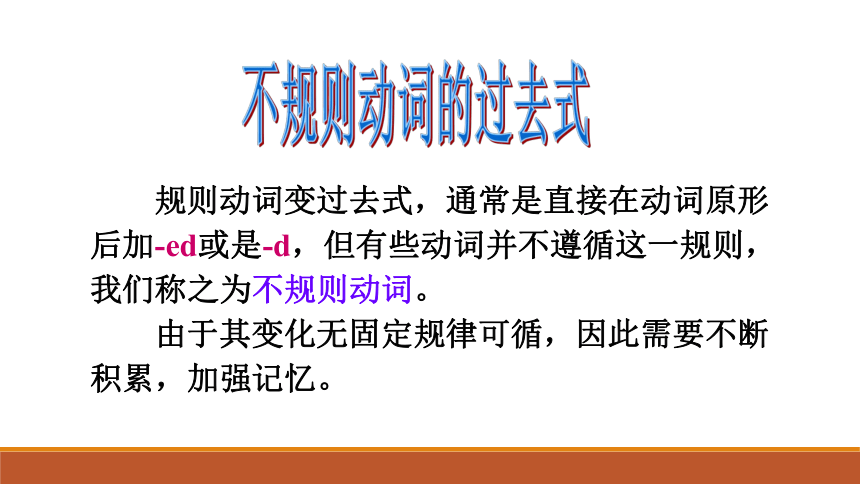

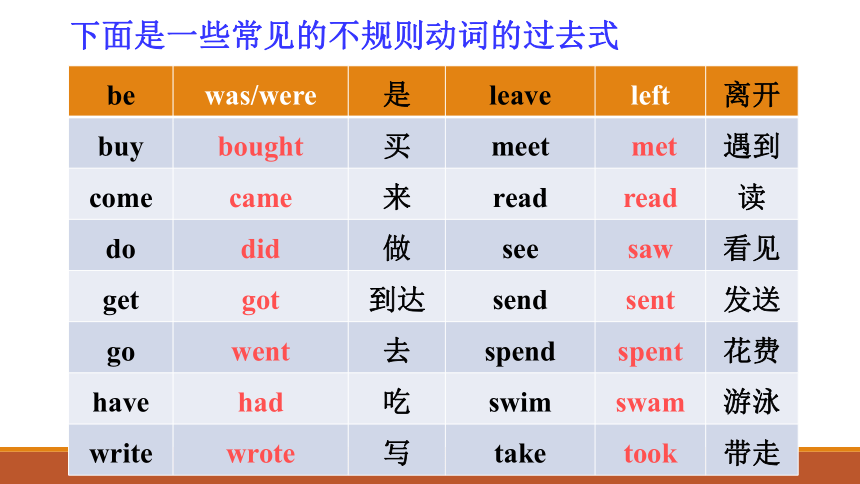

文档简介
(共28张PPT)
Module 9 Life history
Unit3 language in use
Let’s enjoy the story – The Little Prince. Pay attention to the words in red and green.
One day, the little prince decided to leave the planet. He visited six planets successfully, and the seventh planet he visited is the earth.?
There was a boy who had golden hair. He never asked what he asked. Yes, he's the little prince.
The Little Prince wanted to return to the home he dreamed of, so he went back to the place where he landed in the Sahara.
Here, he met a pilot who landed in Sahara due to a plane failure and communicated with heart and heart. (心与心的交流)
Finally, the little prince died with the help of the snake, and his mind returned to his asteroids (小行星).
不规则动词的过去式
规则动词变过去式,通常是直接在动词原形后加-ed或是-d,但有些动词并不遵循这一规则,我们称之为不规则动词。
由于其变化无固定规律可循,因此需要不断积累,加强记忆。
规则动词的变形
(1)在词尾直接加-ed。
(2)以 e 结尾的动词只加-d。
(3)以“辅音字母+y”结尾的动词,变y为i,再加-ed。
(4)以重读闭音节结尾的动词,如果末尾只有一个辅音字母,要双写这个辅音字母,再加-ed。
play – played; work - worked
like – liked; love - loved
study – studied; carry - carried
stop – stopped; plan - planned
be was/were 是 leave left 离开
buy bought 买 meet met 遇到
come came 来 read read 读
do did 做 see saw 看见
get got 到达 send sent 发送
go went 去 spend spent 花费
have had 吃 swim swam 游泳
write wrote 写 take took 带走
下面是一些常见的不规则动词的过去式
are —
read —
take —
eat —
know—
leave —
do —
go —
get —
have/has —
come —
swim —
write —
read —
send —
see — spend — take — meet —
stand —
were
read
took
ate
knew
left
did
went
got
had
came
swam
wrote
read
sent
saw
spent
took
met
Let’s see which group is the best!
stood
Group 4
Group 2
Group 1
Group 3
Complete the passage with the correct form of the words. (P 58)
When my father was young, he (1) __________ (not have) much money. He (2)_______ (begin) work at eight o’clock and (3) ______ (leave) at five. When he (4) _____ (get) home, he always (5)______ (read) a book. In the evening he (6)______ (go) to the park and (7) ____ (have) a good time.
didn’t have
began
left
got
read
went
had
Complete the conversation with the correct form of the words from the box. You can use the words twice. (P 58)
begin do get leave
Tony: What time did you (1) ______ school every day when you were a boy?
Tony’s dad: I (2) ____ at about five o’clock, I think.
leave
left
Tony: And what time did you (3) _____home?
Tony’s dad: Oh, I (4) _____ home about half an hour after that, at half past five.
Tony: Did you (5) _____ a lot of homework?
Tony’s dad: Yes, I (6) _______.
Tony: Did you (7) ______ to play football when you were at school?
Tony’s dad: No, I (8) _______ after you were born.
get
got
do
did
begin
began
Complete the passage with the correct form of the words.
Seventy years ago, when my grandpa was young, life was very different. Grandpa (1) _______ (listen) to music but he (2)_____________ (not watch) TV. He (3) _______ (play) the piano but he (4) __________(not play) computer games. He (5) _______ (have) a telephone, but of course he (6) __________ (not send) emails.
listened
didn’t watch
played
didn’t play
had
didn’t send
His family (7) ____________ (not have) a car. He (8) ______(ride) his bike to school and he (9) ______(travel) by train when he went on holiday. He often (10) _____ (go) to the sea and (11) ______ (swim) in the sea. He (12) ____ (have) a camera, but it (13) ________ (not be) a modern camera and he (14) _________(not take) color photos.
didn’t have
rode
traveled
went
swam
had
wasn’t
didn’t take
be born become come die find go like move read travel
Complete the passage with the correct form of the words and expression from the box.
Hans Christian Andersen was a famous writer of stories for children. He (1)_________into a poor family in Denmark in 1805. His father (2)__________ when the boy was eleven. Hans (3)_________ a few jobs. Finally, at the age of fourteen, he (4)________ to the capital of Denmark to work in the theatre. Then he (5)_________ on to study and later he (6) __________ around Europe.
be born become come die find go like move read travel
tried
died
was born
moved
went
traveled
His first book (7)________ out in 1822. He (8)____________ many stories for children, but older people also (9)______ them interesting. Many of his stories (10)__________very famous, like The Ugly Duckling and The Little Match Girl, People still (11)___________ to read them today and they can (12)__________ them in many languages.
came
wrote
became
like
read
found
Deng Yaping was born in 1973 in Zhengzhou, China. She (1) ________ playing table tennis at five. She was only fifteen when she won her first match for China. She (2) ________ the National Team in 1988. Deng won Olympic gold four times and she (3)_________ famous all over the world. At the age of twenty-four, Deng Yaping (4) _____ the National Team and became a student. She (5) _________ very hard. She then (6) _______ to England and studied there.
joined
became
started
left
worked
went
become go join leave start work
Stratford-upon-Avon
Around the world
Take a trip to Stratford-upon-Avon
Read the passage, tick true (T) or false (F).
1 Stratford-upon-Avon is famous because it is the birthplace of Shakespeare.
2 Stratford is a modern town.
3 You can see Shakespeare’s plays at the Royal Shakespeare Company Theatre.
T
F
T
Let’s listen to the song – Yesterday once more, and fill in the blank with past form as you hear.
When I ( ) young I'd listen to the radio
Waiting for my favorite songs
When they ( ) I'd sing along
It ( ) me smile
Those ( ) such happy times and not so long ago
How I ( ) where they'd gone
But they're back again
just like a long lost friend
All the songs I love so well
Yesterday once more (昨日重现)
当我小时候 聆听收音机
等待着我最喜欢的歌曲
当歌曲播放时我和着它轻轻吟唱
我脸上洋溢着幸福的微笑
那时的时光多么幸福
且它并不遥远
我记不清
它们何时消逝
但是它们再次回访
像一个久无音讯的老朋友
所有我喜爱万分的歌曲
played
was
made
were
wondered
一、选择题。
1. Last week Sue ________.
will see a movie B. saw a movie
C. see a movie
2. Yesterday Mary __________.
will wash the dishes
B. wash the dishes C. washed the dishes
达标练习
3. Where ________ you last night? I was
at home.
A. am B. were C. was
4. Did you visit a friend yesterday?
Yes, ________.
A. I did B. I do C. I was
1. How is Jane yesterday?
2. He go to school by bus last week.
3. He often goes home at 6:00 last month.
4. I can fly kites seven years ago.
5. Did you saw him just now?
一起来纠错:
How was Jane yesterday?
He went to school by bus last week.
He often went home at 6:00 last month.
I could fly kites seven years ago.
Did you see him just now?
6. Tom was watched TV last night.
7. I didn’t my homework yesterday.
8. Who find it just now ?
Tom watched TV last night.
I didn’t do my homework yesterday.
Who found it just now?
Homework
Write a paragraph about the lives of your parents or grandparents when they were young.
Where did they live?
What did they often watch?
What games did they play?
When did they get married?
How did they travel?
Module 9 Life history
Unit3 language in use
Let’s enjoy the story – The Little Prince. Pay attention to the words in red and green.
One day, the little prince decided to leave the planet. He visited six planets successfully, and the seventh planet he visited is the earth.?
There was a boy who had golden hair. He never asked what he asked. Yes, he's the little prince.
The Little Prince wanted to return to the home he dreamed of, so he went back to the place where he landed in the Sahara.
Here, he met a pilot who landed in Sahara due to a plane failure and communicated with heart and heart. (心与心的交流)
Finally, the little prince died with the help of the snake, and his mind returned to his asteroids (小行星).
不规则动词的过去式
规则动词变过去式,通常是直接在动词原形后加-ed或是-d,但有些动词并不遵循这一规则,我们称之为不规则动词。
由于其变化无固定规律可循,因此需要不断积累,加强记忆。
规则动词的变形
(1)在词尾直接加-ed。
(2)以 e 结尾的动词只加-d。
(3)以“辅音字母+y”结尾的动词,变y为i,再加-ed。
(4)以重读闭音节结尾的动词,如果末尾只有一个辅音字母,要双写这个辅音字母,再加-ed。
play – played; work - worked
like – liked; love - loved
study – studied; carry - carried
stop – stopped; plan - planned
be was/were 是 leave left 离开
buy bought 买 meet met 遇到
come came 来 read read 读
do did 做 see saw 看见
get got 到达 send sent 发送
go went 去 spend spent 花费
have had 吃 swim swam 游泳
write wrote 写 take took 带走
下面是一些常见的不规则动词的过去式
are —
read —
take —
eat —
know—
leave —
do —
go —
get —
have/has —
come —
swim —
write —
read —
send —
see — spend — take — meet —
stand —
were
read
took
ate
knew
left
did
went
got
had
came
swam
wrote
read
sent
saw
spent
took
met
Let’s see which group is the best!
stood
Group 4
Group 2
Group 1
Group 3
Complete the passage with the correct form of the words. (P 58)
When my father was young, he (1) __________ (not have) much money. He (2)_______ (begin) work at eight o’clock and (3) ______ (leave) at five. When he (4) _____ (get) home, he always (5)______ (read) a book. In the evening he (6)______ (go) to the park and (7) ____ (have) a good time.
didn’t have
began
left
got
read
went
had
Complete the conversation with the correct form of the words from the box. You can use the words twice. (P 58)
begin do get leave
Tony: What time did you (1) ______ school every day when you were a boy?
Tony’s dad: I (2) ____ at about five o’clock, I think.
leave
left
Tony: And what time did you (3) _____home?
Tony’s dad: Oh, I (4) _____ home about half an hour after that, at half past five.
Tony: Did you (5) _____ a lot of homework?
Tony’s dad: Yes, I (6) _______.
Tony: Did you (7) ______ to play football when you were at school?
Tony’s dad: No, I (8) _______ after you were born.
get
got
do
did
begin
began
Complete the passage with the correct form of the words.
Seventy years ago, when my grandpa was young, life was very different. Grandpa (1) _______ (listen) to music but he (2)_____________ (not watch) TV. He (3) _______ (play) the piano but he (4) __________(not play) computer games. He (5) _______ (have) a telephone, but of course he (6) __________ (not send) emails.
listened
didn’t watch
played
didn’t play
had
didn’t send
His family (7) ____________ (not have) a car. He (8) ______(ride) his bike to school and he (9) ______(travel) by train when he went on holiday. He often (10) _____ (go) to the sea and (11) ______ (swim) in the sea. He (12) ____ (have) a camera, but it (13) ________ (not be) a modern camera and he (14) _________(not take) color photos.
didn’t have
rode
traveled
went
swam
had
wasn’t
didn’t take
be born become come die find go like move read travel
Complete the passage with the correct form of the words and expression from the box.
Hans Christian Andersen was a famous writer of stories for children. He (1)_________into a poor family in Denmark in 1805. His father (2)__________ when the boy was eleven. Hans (3)_________ a few jobs. Finally, at the age of fourteen, he (4)________ to the capital of Denmark to work in the theatre. Then he (5)_________ on to study and later he (6) __________ around Europe.
be born become come die find go like move read travel
tried
died
was born
moved
went
traveled
His first book (7)________ out in 1822. He (8)____________ many stories for children, but older people also (9)______ them interesting. Many of his stories (10)__________very famous, like The Ugly Duckling and The Little Match Girl, People still (11)___________ to read them today and they can (12)__________ them in many languages.
came
wrote
became
like
read
found
Deng Yaping was born in 1973 in Zhengzhou, China. She (1) ________ playing table tennis at five. She was only fifteen when she won her first match for China. She (2) ________ the National Team in 1988. Deng won Olympic gold four times and she (3)_________ famous all over the world. At the age of twenty-four, Deng Yaping (4) _____ the National Team and became a student. She (5) _________ very hard. She then (6) _______ to England and studied there.
joined
became
started
left
worked
went
become go join leave start work
Stratford-upon-Avon
Around the world
Take a trip to Stratford-upon-Avon
Read the passage, tick true (T) or false (F).
1 Stratford-upon-Avon is famous because it is the birthplace of Shakespeare.
2 Stratford is a modern town.
3 You can see Shakespeare’s plays at the Royal Shakespeare Company Theatre.
T
F
T
Let’s listen to the song – Yesterday once more, and fill in the blank with past form as you hear.
When I ( ) young I'd listen to the radio
Waiting for my favorite songs
When they ( ) I'd sing along
It ( ) me smile
Those ( ) such happy times and not so long ago
How I ( ) where they'd gone
But they're back again
just like a long lost friend
All the songs I love so well
Yesterday once more (昨日重现)
当我小时候 聆听收音机
等待着我最喜欢的歌曲
当歌曲播放时我和着它轻轻吟唱
我脸上洋溢着幸福的微笑
那时的时光多么幸福
且它并不遥远
我记不清
它们何时消逝
但是它们再次回访
像一个久无音讯的老朋友
所有我喜爱万分的歌曲
played
was
made
were
wondered
一、选择题。
1. Last week Sue ________.
will see a movie B. saw a movie
C. see a movie
2. Yesterday Mary __________.
will wash the dishes
B. wash the dishes C. washed the dishes
达标练习
3. Where ________ you last night? I was
at home.
A. am B. were C. was
4. Did you visit a friend yesterday?
Yes, ________.
A. I did B. I do C. I was
1. How is Jane yesterday?
2. He go to school by bus last week.
3. He often goes home at 6:00 last month.
4. I can fly kites seven years ago.
5. Did you saw him just now?
一起来纠错:
How was Jane yesterday?
He went to school by bus last week.
He often went home at 6:00 last month.
I could fly kites seven years ago.
Did you see him just now?
6. Tom was watched TV last night.
7. I didn’t my homework yesterday.
8. Who find it just now ?
Tom watched TV last night.
I didn’t do my homework yesterday.
Who found it just now?
Homework
Write a paragraph about the lives of your parents or grandparents when they were young.
Where did they live?
What did they often watch?
What games did they play?
When did they get married?
How did they travel?
同课章节目录
- Module 1 Lost and found
- Unit 1 Whose bag is this?
- Unit 2 Are they yours?
- Unit 3 Language in use
- Module 2 What can you do ?
- Unit 1 I can play the piano
- Unit 2 I can run really fast
- Unit 3 Language in use
- Module 3 Making plans
- Unit 1 What are you going to do at the weekends?
- Unit 2 We're going to cheer the players.
- Unit 3 Language in use
- Module 4 Life in the future
- Unit 1 Everyone will study at home
- Unit 2 Every family will have a small plane.
- Unit 3 Language in use
- Module 5 Shopping
- Unit 1 What can I do for you?
- Unit 2 You can buy everything on the Internet
- Unit 3 Language in use
- Module 6 Around town
- Unit 1 Could you tell me how to get to the Nationa
- Unit 2 The London Eye is on your right.
- Unit 3 Language in use
- Revision module A
- Module 7 My past life
- Unit 1 I was born in a small village.
- Unit 2 I was born in Quincy.
- Unit 3 Language in use
- Module 8 Story time
- Unit 1 Once upon a time….
- Unit 2 Goldilocks hurried out of the house.
- Unit 3 Language in use
- Module 9 Life history
- Unit 1 He left school and began work at the age of
- Unit 2 He decided to be an actor.
- Unit 3 Language in use
- Module 10 A holiday journey
- Unit 1 What did you do?
- Unit 2 This morning we took a walk.
- Unit 3 Language in use
- Module 11 Body language
- Unit 1 They touch noses!
- Unit 2 Here are some ways to welcome them.
- Unit 3 Language in use
- Module 12 Western music
- Unit 1 It's so beautiful!
- Unit 2 Vienna is the centre of European classical
- Unit 3 Language in use
- Revision module B
